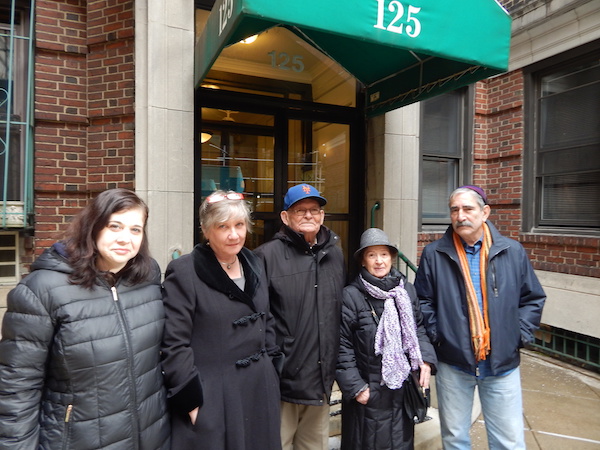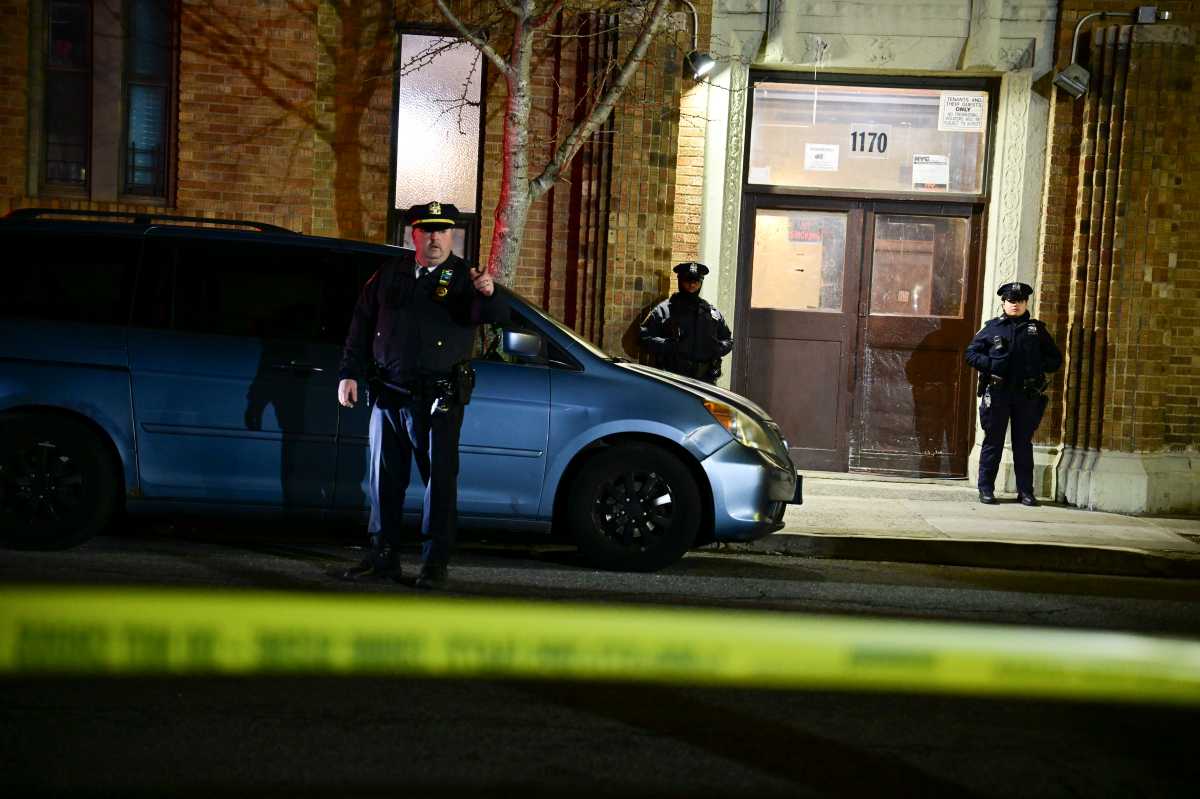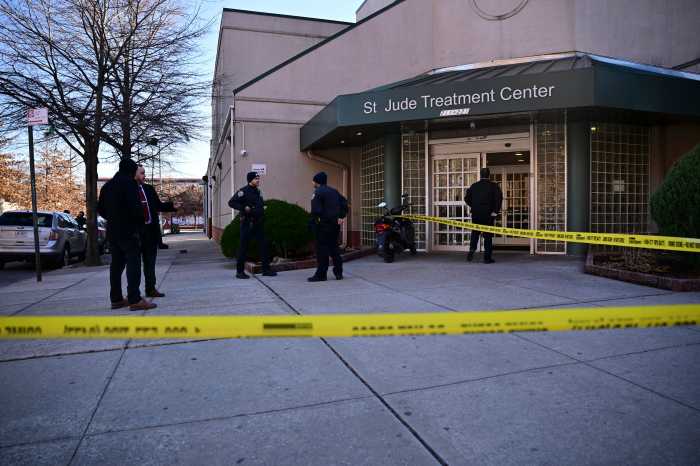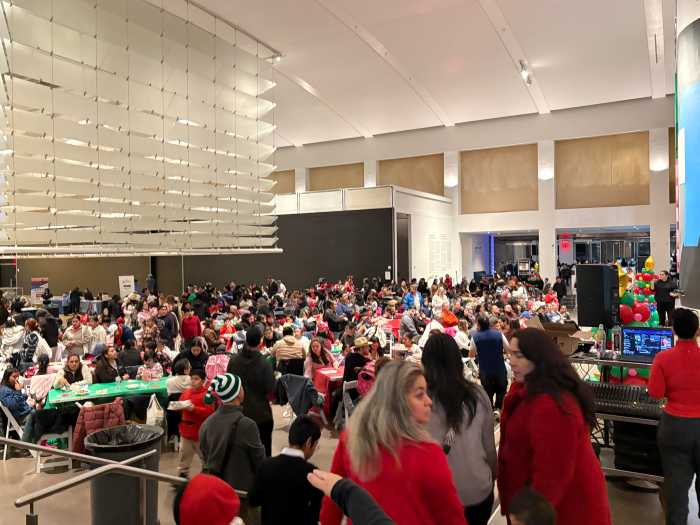
BY DUSICA SUE MALESEVIC | It is a tale full of limited liability companies, buyout offers, and, for some reason, chocolates, that has become all-too-familiar in this current landscape of New York City real estate: longtime, rent-regulated tenants fighting to stay in their homes.
This story, centered on 125 W. 16th St., unfolds as many do, with the longtime owner of the building dying and the property then changing hands.
For decades, the building was owned by a woman who also lived on the property, explained Alison Frauenglass, 37, who has lived in the building for over 30 years. Her mother, now 76, moved into the building when she 22, and Frauenglass said there are many second-generation tenants like her.
It was — and is — the type of building where people knew each other, where Frauenglass babysat the landlady’s grandkids (she joked that the “new girl” is someone who moved in 20 years ago).
“It’s definitely a community — it still is,” Frauenglass said during a recent phone call with Chelsea Now. “We help each other out.”
Another tenant, Anna Wheatley, 58, agreed, saying, “We were an exceptional building from the get-go.”
In April 2015, Raphael Toledano bought the six-story building through a limited liability company, known as an LLC, for $41.5 million, city property records show.
According to Frauenglass, who is spearheading tenant outreach to city and elected officials, the building has 42 units, two of which were offices with separate entrances in the front, with a mix of both rent-regulated and market-rate tenants that got along. Many market-rate tenants have lived in the building for years (the longest one, for 17), and the landlady had been doing minimal rent increases, she said.
After Toledano bought the building, he stopped renewing the leases of the market-rate tenants or gave them small buyouts to leave, Frauenglass said. Either way, at one point, there was a “flood of moving trucks,” and interior construction on the empty apartments began, she said.
Both Frauenglass and Wheatley said the foreman and construction crew were respectful. “It was by the book,” recalled Wheatley, who noted the construction was satisfactorily done and the crew mopped the floors three times a day.
In addition to buying 125 W. 16th St. in 2015, Toledano was snatching up properties in the East Village.
SaMi Chester, a tenant organizer with Cooper Square Committee, said that tenants at those 26 buildings — including 125 W. 16th St. — owned at that time by Toledano and Brookhill Properties, came together to form the Toledano Tenants Coalition.
“Toledano was literally harassing the tenants,” Chester said by phone. “He’s a real piece of work.”
Chester said Toledano and people who worked for him were dropping by tenants’ apartments at 8 p.m. at night. He was at the door “with a box of chocolates and a story why they should leave,” he said.
By New Year’s Eve 2016, the remaining rent-regulated tenants at W. 16th St. got notices that the landlord needed access to their apartments for electrical upgrades, Frauenglass said. The tenants banded together and hired a private attorney — they were willing to give access but wanted to know exactly what was going to be done, she said. Eventually, they backed down, she said.
Toledano has “gutted the apartments and left them empty,” Philip Bruno, 70, who has lived in the building for over 25 years, said by phone.
Michael Leonard, a staff attorney for the Community Development Project of the Urban Justice Center who now represents the majority of tenants at the building, noted that on Jan. 30 of this year, a foreclosure case was filed. Madison Realty Capital foreclosed because the LLC owned and controlled by Toledano was not making its payments, he said. The Real Deal reported that Madison had “provided $34 million in financing” to Toledano.
The foreclosure, Leonard said, left the tenants in limbo. There was no maintenance of the building, and the superintendent and bills for services such as Con Edison were not being paid for a period of time.
“No one is managing the building,” Frauenglass said, noting that around the end of April, early May, the tenants went 10 days without heat or hot water.
The foreclosure proceedings, however, “came to a screeching halt” when the LLC declared bankruptcy at the end of September, Leonard said by phone. All business must now be conducted in a federal bankruptcy court in White Plains, he said.
When reached by phone, Toledano declined to comment due to the proceedings, and said he didn’t own the building anymore.
AAK Acquisitions LLC is in contract to buy the building, The Real Deal reported in September. Leonard said the sale of the building must be approved by the bankruptcy court and that has yet to happen.
Mitchell Greene is the lawyer who represents Richard Cohen, who now manages the LLC that owns the building. Toledano hasn’t controlled the LLC for about six months and while he is still equity owner, if the sale, which Greene said is for about $49 million, is approved and does go through in the next 45 days, “Mr. Toledano will be receiving nothing.”
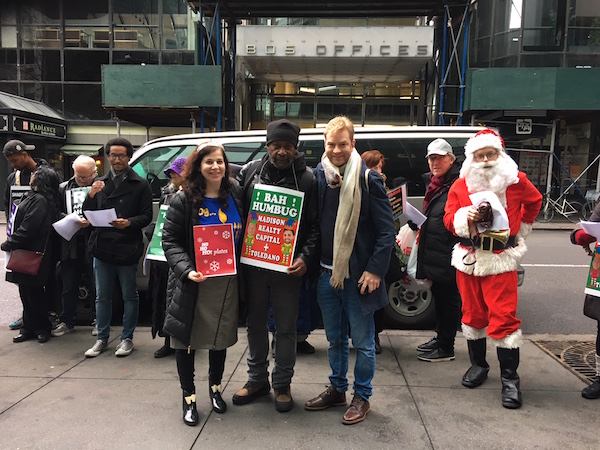
Assemblymember Richard Gottfried, whose office has been working with the tenants, said by phone, “The turmoil in ownership is a problem for tenants. It’s important to know who is charge and who is accountable.”
The tenants are in a “grey area,” State Senator Brad Hoylman said by phone. “At the end of the day, rent stabilization and rent regulation needs to stand for something.”
Bruno, the tenant, said that a man who said his name was Eugene came to his apartment to talk about a buyout. Eugene did not give a last name, Bruno said.
“It scared the hell out of me,” he said.
Eugene said they were going to gut the building, and it could take four to five years to complete construction, according to Bruno. Bruno said he currently has a two-bedroom apartment, but there was no telling how much space he would come back to if he did wait through the construction.
“All this malarkey of pushing us out and coming back to a studio, we’re protected by New York City laws,” he said. “We have a lot of rights and they are trampling on them.”
He added, “I’m 70 years old and I don’t want to move.”
Wheatley, who moved into the building in 1995, said in a phone interview that Eugene came to her apartment as well.
“Eugene didn’t explicitly [say] who he represented but it was very much implied it was the new owner of the building,” she said, noting he did not give his last name or give her a card.
She described Toledano as “hyper, young, talks a mile a minute and didn’t listen,” and “he didn’t come to my apartment but he went to most everybody else’s apartments with chocolates.”
She added, “When Eugene came to my apartment, he did bring a box of chocolates.”
(Bruno said he did not get chocolates.)
Eugene told her that the new owners would begin construction in February — starting with the stairs — and that the building would be unlivable, Wheatley said.
“He presented it as a done deal,” she said. “I’m not naive but I was blindsided.”
William Schneider, an attorney representing AAK Acquisitions LLC, said “no comment” when reached by phone. He did say that Eugene is part of the management company but did not elaborate.
Leonard, the attorney for the tenants, said that there are specific procedures codified in law regarding buyouts, including that the offer has to be made in writing, and, if rejected by the tenant, the landlord can not make another offer for 180 days.
Frauenglass said, “I’m not interested in a buyout. I don’t think the community we have is something you can buy someplace else.”
Leonard, Chester, the tenant organizer, and Hoylman, the state senator, pointed to the role financial institutions, like Madison Realty Capital, play. On Mon., Dec. 18 in the morning, there was a protest in front of Madison’s office at 825 Third Ave. (btw. E. 50th and E. 51st Sts.)
“We want to continue to make noise. There is something rotten in the state of Denmark,” Chester said before the protest.
Hoylman, who was at the protest, said, “This is an example of what’s wrong with our financial institutions, which are propping up fly-by-night developers like Toledano.”
He added they “don’t have the credit worthiness to develop these properties and speculate on rent-stabilized properties with the hope of driving these tenants out. The lending institutions are part of the problem.”
Madison Realty Capital did not return calls requesting comment.
Wheatley said, “We’re not going anywhere. They can’t kick us out — it’s all a scam.”




